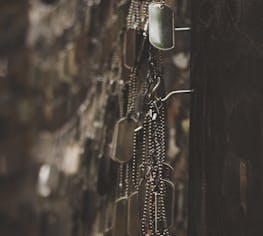Make Your Bed Summary
Little Things That Can Change Your Life… And Maybe The World
Do you need a bit of motivation to rise and shine?
Admiral William McRaven's book, Make Your Bed, might just be the pillow talk you need. McRaven takes us through 10 simple lessons based on Navy SEAL training, that can help us to deal with the challenges and hardships of everyday life.
On May 17, 2014, McRaven addressed the University of Texas's graduating class on commencement day. His speech went viral with ten million views, and formed the basis of his book, which was published a year later. He spoke of ten principles he'd learned during his Navy training, that helped him manage the challenges he encountered during his long naval career. In fact, these principles have guided him throughout his life, and these lessons can apply to all of us. The principles aim to show us how to change ourselves and the world, for the better.
We'll briefly go through each of the ten lessons, interwoven with McRaven's life experiences, and how they might apply to our own lives.
Start Your Day With a Task Completed
Lesson number one is to start the day by ticking off a straightforward task, such as making our beds. The idea is that if we complete one task, this will have a snowball effect, and we'll then be able to find the motivation to tackle other tasks. This simple act gives us a sense of pride that carries us through a long day, until we greet our comfortably made bed at night.
McRaven learned the importance of making his bed correctly, first thing in the morning during his training days as a Navy SEAL. There's no way to sugar-coat the hardships one endures as a cadet-in-training. Any task left undone, or any challenge unmet, has its consequences, even the menial task of making a bed. If cadets failed to follow the bed-making code, they had to perform a "sugar cookie ritual." They'd have to dive into the cold waters of the Pacific Ocean and then roll around on the beach until they were covered from head to toe with sand. However, this routine act of making his bed perfectly, served McRaven in the long run.
Years later, McRaven spent months lying in a hospital bed after suffering a life-changing injury. After his recovery, and once he could stand unaided, the first thing he did was to straighten out his bedding. This simple act of making his bed, gave him hope, and symbolized his discipline and determination to get better.
No Person is an Island
No matter how independent you are, the truth is that you can't go it alone. All of us experience life's tough times, but we shouldn't feel like we need to navigate them by ourselves. The importance of teamwork is drilled into Navy SEALs. For example, as part of McRaven's training, he and his teammates were required to carry an inflatable raft everywhere they went. They'd have to paddle for miles each day, through choppy ocean waters. If one cadet couldn't perform to a high enough standard, then the others had to pitch in. After his near-fatal injury, learning to reach out and accept help from others, especially from his wife, gave McRaven the emotional strength to recover.
McRaven sees life as similar to a small rubber boat that we're unable to paddle by ourselves. 'It takes a team of good people to get us where we want to go' he says, 'so find someone to share your life with, and never forget that success depends on others.'
Size Only Matters When it Comes to Your Heart
We're always told not to judge a book by its cover, and not to judge a person's appearance over their character. So why is it that we continue to value appearance over all else?
When McRaven was considering becoming a Navy SEAL, he paid a visit to a recruitment center where he noticed a frail-looking man named Tom Norris. Upon first glance, one wouldn't think that Norris was a heroic SEAL veteran, yet that's precisely what he was. Lieutenant Tom Norris is a war hero. He'd been shot in Vietnam, while risking his life to save others. He endured a long, painful recovery period owing to his war-injuries, and then continued to serve his country as a member of the FBI hostage rescue team. This example is indicative of the need to reserve judgment until we genuinely come to know the strength of a person's character.
However, later in his career, McRaven repeated the mistake of judging a book by its cover. He thought that two men wouldn't be suitable SEALs, based on how they looked. The two men didn't fit the typical cadet profile of tall and muscular. Instead, according to our author, they were relatively short and meek-looking. But both men surprised him by showing courage in dangerous situations, proving once more that it's what's inside that counts.
Accept That Life's Not Fair
The sooner we accept that life isn't always fair, the easier it'll be to recover from hardships and disappointments. We need to be able to keep moving on, and not looking back. Sometimes life isn't fair or reasonable. McRaven learned this lesson early on in his training. He had an instructor who used to push and punish the cadets for no apparent reason. However, the instructor had his reasons, which were to help his cadets make peace with the fact that life can be unreasonable. We don't have to like this reality, but we have to accept it, and know that we only cause ourselves more suffering if we stay on the blame train. No one is immune to the randomness of misfortune, but we do have a say in how we choose to respond to life's setbacks. McRaven says, 'we can either complain or take the hit and carry on.'
What Doesn't Kill You Will Only Make You Stronger
Failure makes us stronger. It's a hard truth that no matter how hard we try, we'll all face failure at some stage. However, we don't have to fear failure, or feel defeated by it. What if we used it to our advantage?
Take for example the word "circus." For some, the word circus ignites a sense of excitement. However, for cadets, this word can trigger anxiety. The legendary and infamous naval circus, is a strenuous endurance test that has been known to push cadets to their limits, and cause some to give up and quit the academy altogether. For many cadets, the circus was their breaking point. For McRaven on the other hand, it was his breakthrough.
Failure can quite literally make us stronger. During his training, McRaven and his swimming partner, performed poorly on a two-mile swim. As a consequence, they faced the dreaded circus. At the end of a long day, they had to complete the two-hour circus endurance test. Exhausted by this test, again they performed poorly the next day during their regular training. So once more, they had to complete the circus. And so the cycle continued. However, instead of giving in, they pushed harder, and, ironically the extra training is what helped them rise to the top of their class.
Dare Greatly
When was the last time that you jumped headfirst into something?
Part of McRaven's SEAL training was to complete an obstacle course, where he had to slide down a hundred-foot zipline headfirst. Fearful, McRaven tried what felt like the safer strategy - the feet-first technique, which proved less effective. If he wanted to pass the course, he had to take a risk. So finally, he went down headfirst and crossed the finish line in record time.
Once again, the snowball effect came into play, and this daring nature carried through onto the battlefield. In 2004, on tour in Iraq, McRaven was faced with a high-risk hostage situation. There was an enemy compound that held three hostages. The intel provided informed him that the enemy and the captives would soon be on the move. McRaven knew the risks that come with a daytime raid, but he pushed aside his fears and gave the orders to execute the mission. The mission was successful, and the hostages were rescued. If we always play it safe and continuously try to mitigate potential struggle, humiliation, or failure, we will find it hard to reach our potential.
Make Courage Your Friend
There will always be times where we feel afraid or anxious, and it's especially important to dig deep during these times. When we're most scared, we need to find the courage to help us surmount obstacles to achieve our goals. Completing a four-mile ocean swim is hard at the best of times. Doing it at night, in shark-infested waters, is quite another. This was yet another task McRaven had to complete to become a SEAL. When life throws us with what often feels like insurmountable challenges: hold onto courage and keep swimming.
Rise to the Occasion
It's often the darkest moments that reveal our most profound strength. Witnessing the loss of a comrade in battle is one of the most soul-wrenching experiences for a soldier. However, after paying respects, McRaven remained inspired by how soldiers could push past their pain and grief and stay firm during combat. They showed bold strength and dignity, revealing the best of humanity in the most inhumane situations. They stood tall in the midst of darkness.
It's always worth remembering that there will be moments in life where our spirit feels crushed, and hope is hard to access. It's these moments that call on us to search for the best in us.
Give People Hope
Hope is something that a lot of us cling on to. We can also inspire hope and be strong for others.
Have you ever had a week from hell? Well, "hell week" is something Navy SEALs know all about. It's a seven-day endurance test, with some extremely grueling activities. McRaven recalls one night during hell week, where he and his comrades had to sit in cold wet mud for a whole night. All the men were exhausted, and close to giving up. But one of the men started to sing, and he inspired others to sing along too. It was this simple act that gave them the strength to get through the night.
Inspiring hope creates a ripple effect. It only takes one person to change the tune of a situation. So as McRaven says, 'if you want to change the world, start singing when you're up to your neck in the mud.'
This brings us to the last lesson.
Never, Ever Quit
McRaven started SEAL training as one of 150 cadets. On the first day of training, their commander introduced them to "the bell." He said that in the next six months, he would push the cadets to their limits. If they couldn't take anymore, they could ring the bell three times and would then be free to leave. Many cadets would ring the bell over the next six months, but not McRaven. He and 32 other cadets stood proud at their graduation. When you reach the precipice between quitting and continuing, hold steady and keep going.
If you want to throw in the towel, remember the strength of others. McRaven reminds us of the heroic soldiers who push forward despite tragedy. A landmine in Afghanistan badly wounded a soldier named Adam Bates. He lost both his legs and suffered from severe burn injuries. Despite this, when McRaven visited Bates in the hospital, he used sign language to tell McRaven that he'd be alright. McRaven recalls this moment of inspiring strength, to remind us that if someone like Bates can keep going, then so can we.
In Conclusion
If you're looking for sage advice, then this is the book to place beside your neatly made bed. McRaven teaches us that while life is tough, we can meet challenges with discipline, determination, and a positive attitude. We can also enlist the support of others. He inspires us to think big, but also to take care of the little things. Most often, meaning stems from mindfully attending to tasks that might appear menial at first. But as the Zen Buddhist saying goes, 'how you do anything is how you do everything.' The little things become the big things.
So, other than neatly folded bedding, what is one small change you plan to make, that just might change the world in a big way?




